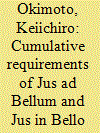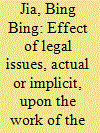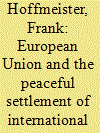|
|
|
Sort Order |
|
|
|
Items / Page
|
|
|
|
|
|
|
| Srl | Item |
| 1 |
ID:
110903


|
|
|
|
|
| Publication |
2012.
|
| Summary/Abstract |
Let me begin by extending hearty congratulations on the opening of the Biennial Conference of the Asian Society of International Law in Beijing and a warmest welcome to scholars of international law from various countries and regions and all the guests present today.
|
|
|
|
|
|
|
|
|
|
|
|
|
|
|
|
| 2 |
ID:
110906


|
|
|
|
|
| Publication |
2012.
|
| Summary/Abstract |
It is sometimes suggested that even if certain measures in self-defense violate jus in bello (international humanitarian law), such measures can be continued by justifying them on the basis of jus ad bellum (international law regulating the resort to force), in particular by justifying that the measures were necessary and proportionate in relation to the initial armed attack. However, State practice, decisions of international courts and arbitration, and opinions of experts indicate the contrary, that if the measures in self-defense violate jus in bello, those violations cannot be ignored or nullified by justifying the measures as necessary and proportionate self-defense. Once the measures in self-defense violate jus in bello, they must be ceased immediately.
|
|
|
|
|
|
|
|
|
|
|
|
|
|
|
|
| 3 |
ID:
110908


|
|
|
|
|
| Publication |
2012.
|
| Summary/Abstract |
The mandate and working procedure of the Commission on the Outer Limits of the Continental Shelf (CLCS) are defined primarily by Article 76(8) and Annex II of the United Nations Convention on the Law of the Sea (UNCLOS). The nature of the work of this body is a mixture of technological, scientific and legal elements. The question arises in practice as to what legal effect, if any, the CLCS's recommendations will have on points of law that concern the interpretation and application of the UNCLOS. Article 76(8) and other instruments related to the CLCS's work leave certain issues undefined, such that disputes between States in the delineation of the outer limits of a continental shelf may result in limits which lack both finality and binding force. It is suggested that to avoid that situation, general acceptance by other States concerned is necessary, and that the CLCS may consider referring a legally disputed point for another competent body to determine, before it proceeds with the making of recommendations.
|
|
|
|
|
|
|
|
|
|
|
|
|
|
|
|
| 4 |
ID:
110907


|
|
|
|
|
| Publication |
2012.
|
| Summary/Abstract |
Under its quasi-constitutional mandate to strive for the peaceful settlement of international disputes, the European Union (EU) acts as litigator and political mediator in diplomatic practice. Accordingly, this article presents the legal foundations and practical material where the Union litigated cases as a party before the World Trade Organization or UN Convention on the Law of the Sea dispute settlement bodies, or submitted amicus curiae briefs before international tribunals. It then recalls the EU's contributions to conflict management through military, police, rule of law and border missions based on a request from the third party or the third parties involved. Moreover, the EU's role in the conflicts between Russia and Georgia, in the Cyprus problem and in the Slovenia/Croatia border conflict is reviewed. The author concludes that there is ample evidence of relevant Brussels-based practice supporting the principle of peaceful settlement of international disputes, as enshrined under Article 33 of the UN Charter. The fact that such practices stem from an international organization shows that the principle remains a major achievement of the global legal system, which encompasses all international actors.
|
|
|
|
|
|
|
|
|
|
|
|
|
|
|
|
| 5 |
ID:
110905


|
|
|
|
|
| Publication |
2012.
|
| Summary/Abstract |
International criminal justice is a relatively new field of international law. For this reason alone, it excites curiosity. Minute traces of the new development are to be found in the years preceding the Treaty of Versailles. The provisions of that treaty relating to the subject were less than credibly performed. The International Military Tribunal caught the attention of jurists for a while, but thereafter the matter went in practice into a 50-year somnolence until re-awakened in 1993 by the establishment of the International Criminal Tribunal for the former Yugoslavia. The reason why an interest has to be taken in the subject exceeds the novelty of the field: it has to do with substance. The traditional immunity of presidents or heads of government, prime ministers and other functionaries acting in an official capacity no longer prevails; the doctrine of superior orders is inapplicable except, where appropriate, as in mitigation; and the gap between international armed conflict and internal armed conflict has closed. More generally, the bridge has been crossed between the responsibility of the State and the criminal liability of the individual. As a result, the traditional impunity of actors for the State has practically gone. Judge Wang Tieya helped in this process and merits grateful thanks.
|
|
|
|
|
|
|
|
|
|
|
|
|
|
|
|
| 6 |
ID:
110910


|
|
|
|
|
| Publication |
2012.
|
| Summary/Abstract |
Upon its accession, China established a judicial review mechanism for trade remedy determinations pursuant to WTO rules. However, the operational details of the mechanism remain unclear. This paper fills the research gap by discussing the main issues in the judicial review process, including types of determinations that are reviewable, which parties may participate in such cases, which court has the jurisdiction, standards applicable in reviews of law and facts, burden of proof, evidentiary rules, direct application of WTO agreements, appeal mechanism and remedies available. The paper concludes that while China has built a judicial review mechanism that satisfies the minimum requirements of the WTO, its utility is greatly restricted by problems within the judicial system in general. Unless broad changes are made, judicial review will remain an untested theoretical possibility.
|
|
|
|
|
|
|
|
|
|
|
|
|
|
|
|
| 7 |
ID:
110909


|
|
|
|
|
| Publication |
2012.
|
| Summary/Abstract |
On 2 May 2011, a team of US Special Forces executed an operation against Osama Bin Laden in Pakistan. The extraterritorial use of force against a non-State actor in the territory of another State with the aim of using lethal force against an individual is recognized as the phenomenon of targeted killings. Such operations exist on two levels: the extraterritorial use of force in the territory of another State and the use of lethal force against an individual. However, such operations also appear to blur and challenge boundaries within the international legal framework. This paper aims to clarify the existing rules within international law which govern targeted killings. The operation against Bin Laden will be used as a study to facilitate understanding of the legal considerations which arise in assessing the prohibition and permissibility of Targeted Killings under the existing framework of international law. This paper will examine the official US position under international law on targeted killings and the operation against Bin Laden to identify the legal justifications put forward. The paper will then continue to examine these legal justifications under existing frameworks in international law from three legal regimes which come into play: (i) jus ad bellum; (ii) jus in bello; (iii) International Human Rights Law.
|
|
|
|
|
|
|
|
|
|
|
|
|
|
|
|
| 8 |
ID:
110904


|
|
|
|
|
| Publication |
2012.
|
| Summary/Abstract |
A dispute is a disagreement on a point of law or fact, a conflict of legal views or of interests between two persons": this well-known definition is set out in the Mavrommatis case of 1924 and repeated in a number of other verdicts of the two Hague Courts.
|
|
|
|
|
|
|
|
|
|
|
|
|
|
|
|
|
|
|
|
|